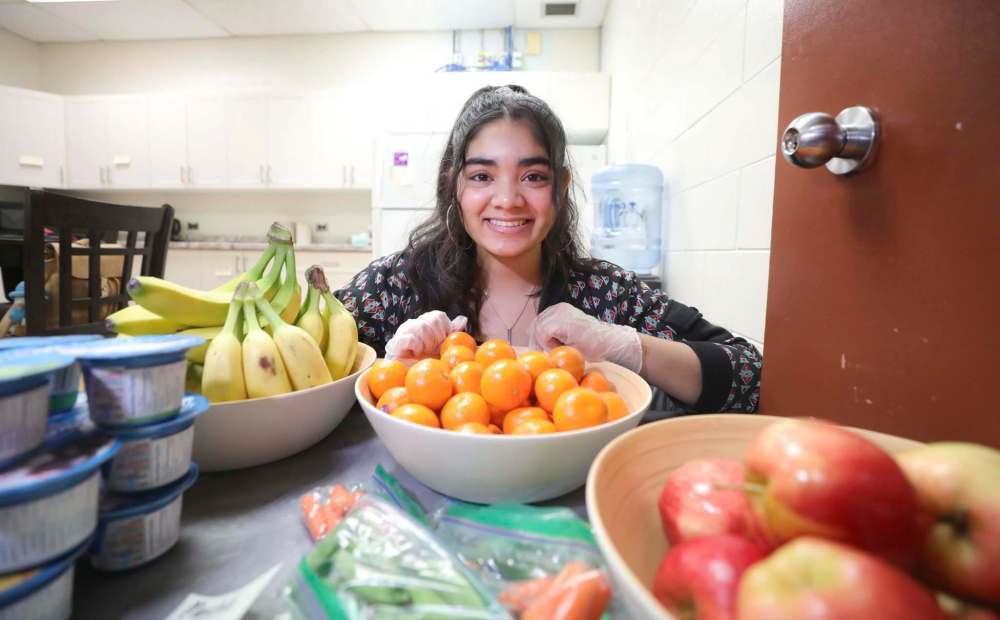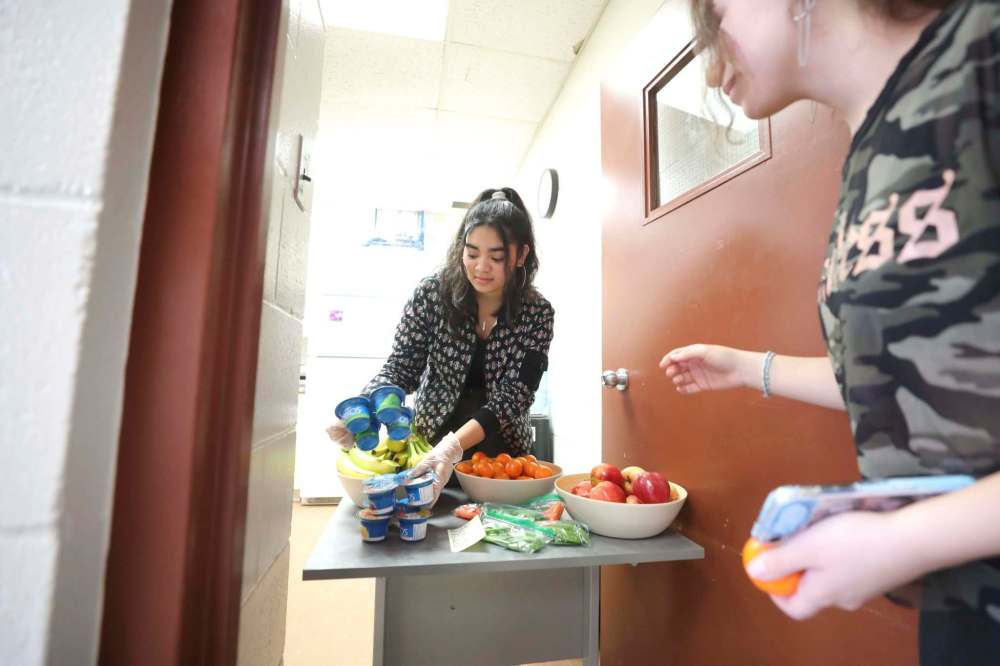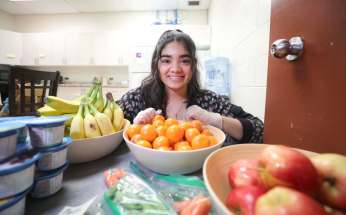Food for thought The Child Nutrition Council of Manitoba helps schools across the province make sure students don't go hungry
Read this article for free:
or
Already have an account? Log in here »
To continue reading, please subscribe:
Monthly Digital Subscription
$0 for the first 4 weeks*
- Enjoy unlimited reading on winnipegfreepress.com
- Read the E-Edition, our digital replica newspaper
- Access News Break, our award-winning app
- Play interactive puzzles
*No charge for 4 weeks then price increases to the regular rate of $19.00 plus GST every four weeks. Offer available to new and qualified returning subscribers only. Cancel any time.
Monthly Digital Subscription
$4.75/week*
- Enjoy unlimited reading on winnipegfreepress.com
- Read the E-Edition, our digital replica newspaper
- Access News Break, our award-winning app
- Play interactive puzzles
*Billed as $19 plus GST every four weeks. Cancel any time.
To continue reading, please subscribe:
Add Free Press access to your Brandon Sun subscription for only an additional
$1 for the first 4 weeks*
*Your next subscription payment will increase by $1.00 and you will be charged $16.99 plus GST for four weeks. After four weeks, your payment will increase to $23.99 plus GST every four weeks.
Read unlimited articles for free today:
or
Already have an account? Log in here »
Hey there, time traveller!
This article was published 09/03/2020 (2106 days ago), so information in it may no longer be current.
‘Hey, can you grab me an orange?”
It’s 11:30 a.m. on a Friday at Glenlawn Collegiate, and students of all ages and backgrounds are stopping by the school’s community kitchen. Two girls walk away chatting and peeling their oranges; a group of boys stop by looking for yogurt, which a student volunteer supplies.
This is what a school nutrition program can look like.
The community kitchen program at the St. Vital high school is just one of such programs assisted by the Child Nutrition Council of Manitoba, a charitable organization that supports breakfast, lunch and snack programs in schools across Manitoba.

“The main goal of these types of programs is to make sure that every student in the school environment has the same opportunity to learn, and we know that one of the biggest factors to that can be hunger,” says Janelle Wotton, a program dietitian for the council. “Hunger can be for many different reasons. Students may not be able to bring food to school to have throughout the day, or it can be a long time since they’ve eaten because they came early to participate in extracurriculars. We want to make sure that hunger isn’t something setting children back in the classroom.”
During the 2018-19 school year, the council provided just over $1 million to 271 Manitoba school nutrition programs, which reached 30,500 students and served more than 4.8 million meals and snacks. The council has programs in every school division in Winnipeg.
Soup for a soup-er cause
On Wednesday, the Child Nutrition Council of Manitoba is holding its eighth annual Stone Soup fundraiser.
On Wednesday, the Child Nutrition Council of Manitoba is holding its eighth annual Stone Soup fundraiser.
From 11 a.m. to 1:15 p.m., Winnipeggers can come down to the Manitoba Hydro Place Gallery, 360 Portage Ave., and, for a minimum donation of $15, try three soups created by 12 city chefs and vote for your favourite. (I am one of the local “celebrity” soup judges.) Named for the European folktale in which townsfolk are convinced to each share a small amount of their food in order to make a meal for all, Stone Soup encourages Winnipeggers to “fill the pot” so that the council can continue its work.
“Stone Soup was started to celebrate everyone coming together to raise awareness and funds for school nutrition programs,” says Janelle Wotton, a CNCM program dietitian. “To thank all of our supporters and funders throughout the year for how they’ve been able to support us, but then to bring in new people from the community to learn about why these programs are important.”
Schools self-identify a need for a program and apply for support each spring. Programs are school-led, Wotton says: some schools may find a full, sit-down breakfast is needed, while other schools are better served by a grab-and-go snack program.
Programs are available for any school-aged student at no cost to the student, regardless of perceived need.
“We wanted to make our program accessible to all students, because we don’t know what hunger looks like,” says Jason Ritchot, community liaison worker at Glenlawn. “We wanted to reduce the stigma, so all of our food programs are open to everyone and anyone. There are a lot of students that are coming to school hungry, and students can’t focus when they’re hungry. We’ve had students come in and say, ‘I don’t know what I’d do without this program.’”
The community kitchen program started five years ago — with a grant from the nutrition council — in what was an old photocopier room. “Basically, we had a little bit of yogurt and cheese in the fridge, and granola bars stacked on these chairs.”

Still, kids were using it. Glenlawn has since converted that photocopier room into a full kitchen. The community kitchen program is run by student volunteers, who work during “C-slot,” which is from 11 a.m. to 12:15 p.m., if they have a spare, or during the lunch hour, serving healthy, grab-and-go snacks to their classmates.
Friday’s menu: apples, oranges, bananas, snap peas, carrots and just about every flavour of yogurt you can think of. Cheese strings are also very popular.
“Our students are always busy and always in a rush,” Ritchot says. “They’re in a rush to get here for 8:30 a.m., they have intramurals and gym activities and work and volunteering. So we try to keep it quick and simple and healthy.”
And accessible. If a student needs something from the kitchen during off hours, staff can open it up. Student Services will also provide program snacks for those who don’t feel comfortable going to the kitchen. Glenlawn’s student council also hosts a monthly breakfast that’s open to all students.

Tahiya Maheen, 16, is Friday’s student volunteer. The Grade 10 student been lending her time since February. “I have a C-slot spare and it was a bit boring, so I thought, ‘Why not volunteer?’” she says. “I think (the program) is important because some students don’t bring their lunch. It’s a snack that I also sometimes take.”
Like many students at Glenlawn, Tahiya is involved in extracurricular activities, so her day isn’t always done when the final bell rings at 3:30 p.m. Sometimes, an added snack is required to power through the extra hours. Lately, she’s been working on costumes for the school’s production of Seussical the Musical.
School nutrition has been top of mind after Premier Brian Pallister panned a proposal for a universal breakfast program last week, pointing to studies that show the benefits of eating together and arguing that a breakfast program would take that valuable time away from families.
But while everyone gathered around a breakfast or dinner table discussing their days over a nutritious, home-cooked meal is certainly idyllic, it’s not a reality for many families, whether they are struggling to put food on the table or trying to balance an over-stuffed schedule.
“A lot of kids don’t bring lunch to school, and not just for the reason that they don’t have it,” says Melen Worku, 16, a Grade 11 student at Glenlawn who uses the community kitchen. “Sometimes kids forget, or they don’t have time. It’s a busy life, with school and work. It’s stressful. So it’s good to have something like this.”
Melen says lots of kids use the program, which she believes should be in every school.
“Whether you don’t have access to food or don’t have time, it’s a good asset to have in a school. Anyone who wants it can use it.”
jen.zoratti@freepress.mb.ca
Twitter: @JenZoratti

Jen Zoratti is a Winnipeg Free Press columnist and author of the newsletter, NEXT, a weekly look towards a post-pandemic future.
Our newsroom depends on a growing audience of readers to power our journalism. If you are not a paid reader, please consider becoming a subscriber.
Our newsroom depends on its audience of readers to power our journalism. Thank you for your support.








